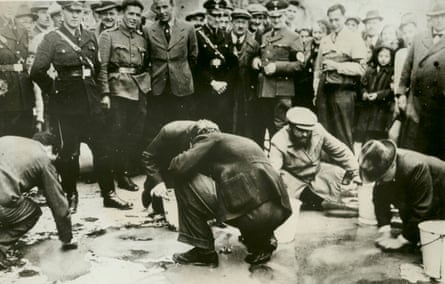Tens of thousands of British citizens are among the many descendants of Jewish refugees who can apply for Austrian citizenship from Tuesday under a new law that campaigners say finally delivers a measure of historic justice for their ancestors’ expulsions under Nazi rule.
About 120,000 Jewish refugees fled persecution after the Nazis took power in Austria in March 1938. The second most common destination after the US was the UK, with up to 20,000 refugees registered in 1945.
Most refugees naturalised in their adoptive countries out of necessity, but the postwar Austrian state had a bar on dual citizenship, so considered them to be foreigners.
All obstacles to former refugees reclaiming Austrian citizenship were lifted in 1993, after the country began its first real debate about its culpability for Nazi-era crimes. Around 10% of survivors took it up. But a law extending the possibility of dual citizenship to descendants eluded its advocates in the Austrian parliament, suggesting a lack of interest in restoring the once 200,000-strong Jewish community, even in principle. One rightwing MP reportedly objected: “Enough has been done for the victims already.”
It took the present chancellor Sebastian Kurz, of the rightwing Austrian People’s Party, to bring conservatives into line with the other mainstream parties. Since he was first elected in 2017, Kurz has asserted repeatedly the country’s friendship with Israel and its responsibility towards Austrian victims of national socialism.
Hannah Lessing, secretary general of the National Fund of the Republic of Austria for Victims of National Socialism, lobbied successfully to include more descendants – for example, of those who left Austria after the war if they were unable to settle. She applauded the law, while recognising its limits.
“This law is an important step that says Austrian society is finally ready to welcome the families that it drove away,” she said. ‘However, like other gestures, it can never truly make amends for the Holocaust.”
Bini Guttmann, the Austrian president of the European Union of Jewish Students, urged people to look beyond such gestures to the country’s current political climate. “Unfortunately, the far right is on the rise again in Austria, assisted by politicians who have adopted its discriminatory agenda,” he said. “As a result, many among Austria’s minorities feel that they are not welcome here.”
But most applicants from the minimum of 200,000 people estimated to be eligible by the Austrian government are likely to look past Austria’s contemporary politics to focus on the benefits of EU citizenship.
An EU passport project hosted by the Jewish Historical Society of England asks former Jewish refugees from Europe and their descendants to describe their motivations for or against reclaiming European citizenship.

Simon Albert, who initiated the project with Dr Ruvi Ziegler, said: “The benefits of EU citizenship have driven a post-2016 surge in citizenship applications from British people with a Jewish background to countries their ancestors fled, in Germany’s case up to 6,000.
“Such a ‘return’ is unprecedented in Jewish history and raises often painful dilemmas, unlike for other Brits claiming EU citizenship. I expect numerous applications to Austria because the new law multiplies the number of eligible descendants.”
Becca West, 26, the grandchild of a refugee who escaped in 1939 , said she would apply. “EU citizens’ rights are important, but my grandfather had a strong Austrian identity despite his suffering. Citizenship is mainly a way to know his character better,” she said.
However many dual citizens are created under Austria’s new law, which brings it into line with Germany’s legislation, they are unlikely to boost Austria’s small resident Jewish population of approximately 10,000.
Guttmann suggested that descendants could nevertheless make their presence felt. “Descendants know where intolerance can lead,” he said. “As citizens, I would encourage them to have a say in the country’s direction through their vote. That way the citizenship law offers more than historic justice, because it can also help to deliver justice for their successors here and for the future.”
